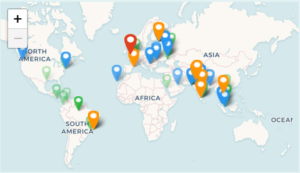Analyse data with coding tools to foster authorship
Data science is vital in the digital age to support Responsible Research and Innovation.
This initiative based on various projects focuses on big data, mixed methods and coding tools to examine how to foster scientific authorship and competences for practice and policy changes.

References
Okada, A., Noguera, I., Alexieva, L., Rozeva, A., Kocdar, S., Brouns, F., … & Guerrero‐Roldán, A. E. (2019). Pedagogical approaches for e‐assessment with authentication and authorship verification in Higher Education. British Journal of Educational Technology.
Okada, A., Whitelock, D., Holmes, W., & Edwards, C. (2019). e‐Authentication for online assessment: A mixed‐method study. British Journal of Educational Technology, 50(2), 861-875
Okada, Alexandra and Whitelock, (2018) Denise Responsible Research and Innovation with data science: a novel approach to evaluate trust of the European TeSLA system. In: 6th International Conference on Human-Agent Interaction, 15-18 Dec 2018, Southhampton.
Okada, A., Whitelock, D., & Holmes, W. (2017). Students’ views on trust-based e-assessment system for online and blended environments.
Okada, A., Whitelock, D., Holmes, W., & Edwards, C. (2017, October). Student Acceptance of Online Assessment with e-Authentication in the UK. In International Conference on Technology Enhanced Assessment (pp. 109-122). Springer, Cham.





 VISUALISING ARGUMENTATION
VISUALISING ARGUMENTATION